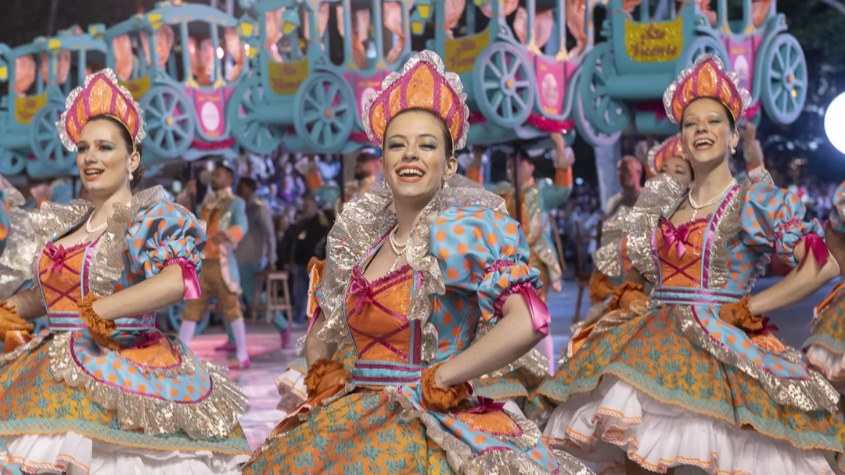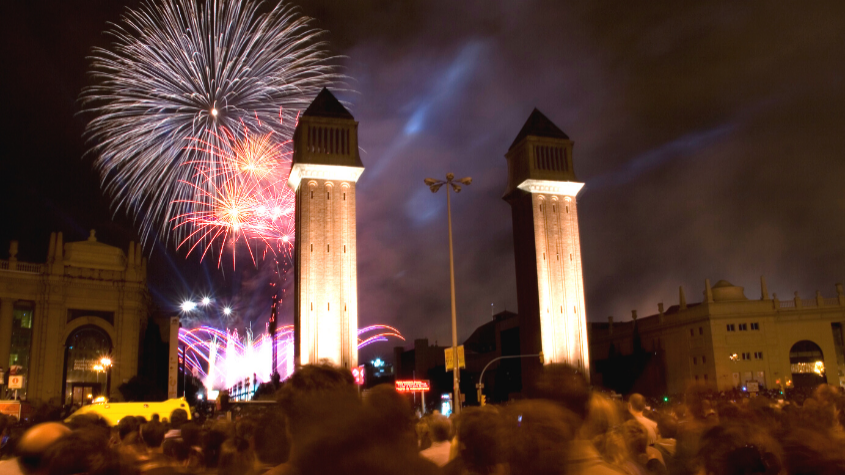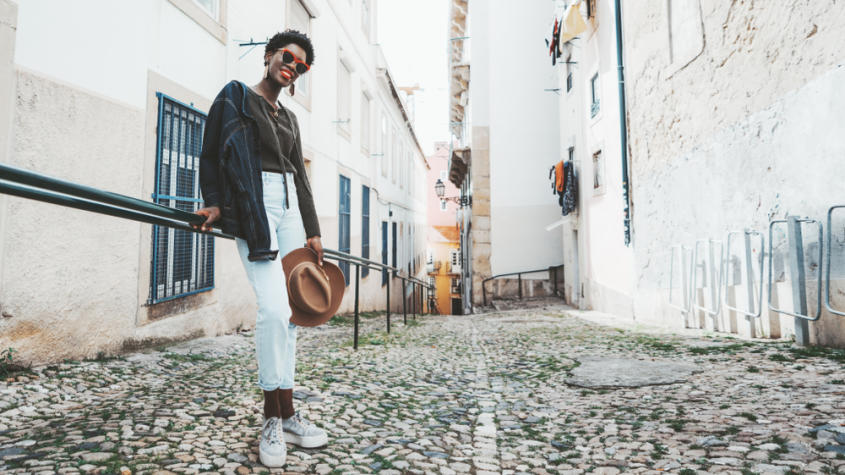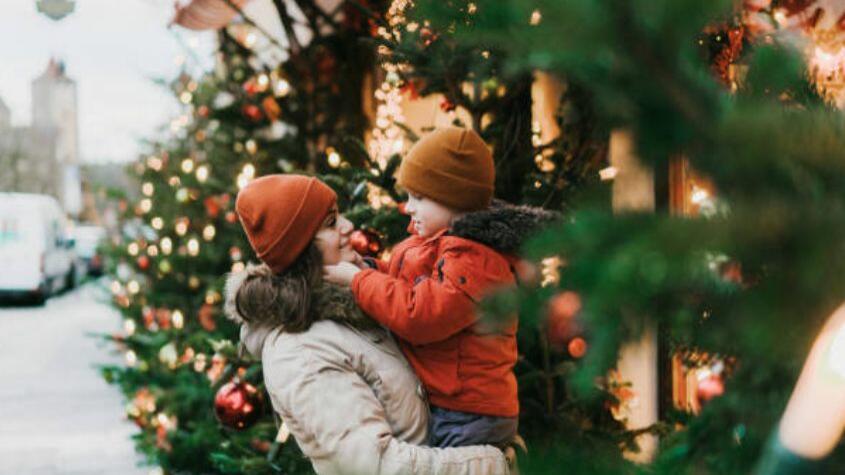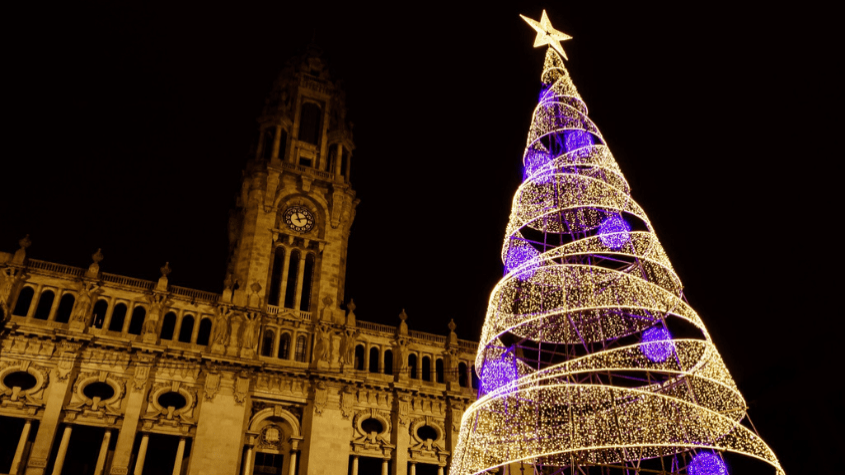
The Portuguese Christmas
"Hmm ... it smells like Christmas ..."
In Portugal, Christmas smells like holly and pine, with fragrances of cod and endless sweets, nuances of a thousand lights, and musical notes.

On tiptoe, Christmas arrives in Portugal.
Trailing the country from one end to the other, we find decorations and songs alluding to the time on every corner, street, house or monument. There are villages that, due to their own charm, seem to live Christmas throughout the year, as is the case of the nativity scene village of Piódão.

There are cities that embrace the Christmas spirit by creating Theme Parks for the youngest, such as Óbidos - Vila Natal (Christmas Village), or Santa Maria da Feira - Perlim. For the grown-ups, Christmas markets appear, where Portuguese artisans give free rein to their imagination.

Inside doors, the Christmas spirit also reigns. With slippers on their feet, children are thrilled when the time comes to help their parents decorate the Christmas Tree, perching on the pine tree to place the balls and other ornaments. Although there are families that opt for more contemporary decorations, as a rule, in a portuguese house, there is always a nativity scene in a well-deserved place. There are those who maintain the very old custom of placing it in a soft bed of moss and of not put the Baby Jesus !!!!! Intrigued ?? The Portuguese, by tradition, place the Child only after the Midnight Mass, which marks the Birth of Jesus, at 00:00 on December 25th.

Nowadays, the little kids write letters to Santa Claus asking for his favorite gift and explaining how exemplary their behavior was throughout the year. However, as a child I remember my grandmother telling me that it was the Baby Jesus who offered me the gifts ... this was the old tradition. Regardless of who comes the offering, the children open their gifts at midnight on December 25th, or just the next morning.
Christmas night is shrouded in magic. With a sparkle in their eyes, the whole family gathers around a table decorated with precept, where candlelight brings peace and hope. In the vast majority of portuguese houses the meal consists of traditional boiled cod. However, there are regions that also have other dishes by tradition: Algarve - rooster of "cabidela"; Trás os Montes - boiled octopus; Lisbon and Tagus Valley - roasted turkey; Azores - there are those who opt for greaves with yams and black pudding with sweet potatoes.
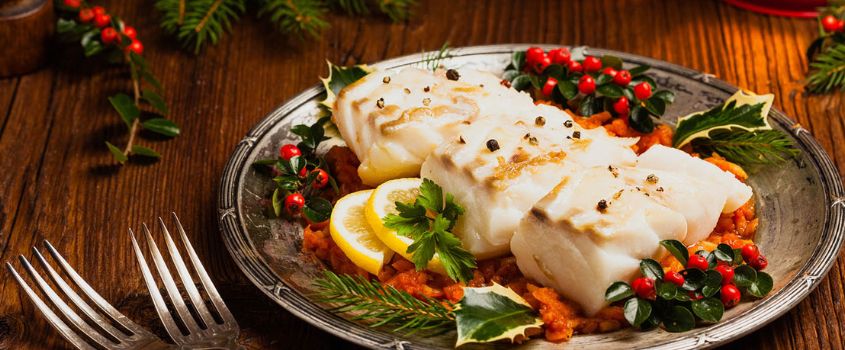
The next moment is to cry out heaven! Many are on a diet in the days leading up to this evening just to enjoy the 1001 desserts on the Christmas table: Bolo Rei (a kind of English Cake - stuffed with dried fruit and candied fruit is a clear reference to the offerings of the Three Magi); the Pão de Ló (similar to Sponge Cake); Rabanadas (French toast); Sonhos; Azevias; Coscorões; Filhoses; Aletria (Vermicelli); Arroz Doce (Sweet Rice); Leite Creme (Crème Brûlée); Cheeses; Port wine ... an endless sweets, that makes anyone get up from the table with a belly rivaling with the one of Santa Claus.
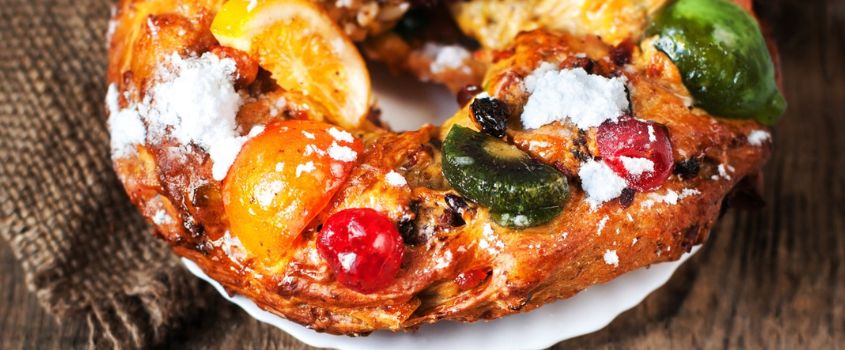
This is the Christmas that all Portuguese experience. However, there are places that have their own Christmas traditions.
Affectionately I call to my country my "patchwork blanket". We have a feeling of a single nation, but each region has its own identity, its own traditions, like those of the Christmas season.
Has anyone heard of the Festa dos Rapazes (Boys' Festival)? And Missas do Parto (Parturition Masses)? And the Madeiro de Natal (Christmas tree)? D'O Menino Mija? (Does the boy pee?)? Bananas House? Have any reader already sung Janeiras?
I believe you feel curious.
Festa dos Rapazes - Boy's Festival (Trás os Montes region)
In Trás os Montes region, people believe equally in the existence of God and saints, as in the existence of the devil and witches. So, in these places, the profane and the sacred are hand in hand.
From December 24th to January 6th, during the Winter Solstice, in a pagan past, the people of these lands would celebrate the worship of the Sun. With the advent of Christianity, these festivities will have been adapted by the Church, dedicating them to Saint Stephen.
The Boy's Festival celebrates the passage of boys from about sixteen years old to adulthood. At the play of bagpipes, drums and songs, it is to see a group of masked men wearing traditional costumes and masks parading through the village. There is time for public collection and mischief.
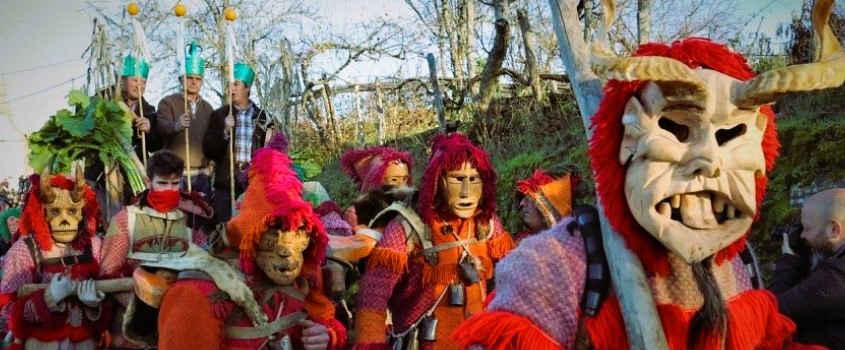
Missas do Parto - Parturition Masses (Madeira)
From the 16th to the 24th of December, Madeira celebrates one of its main Christmas traditions: the Parturition Masses.
Old custom and documented at least since the 18th century, these masses are celebrated in the early morning, between 5am and 7am. They consist of 9 masses celebrated in the novena that precedes Christmas Day.
On December 17th, the Church celebrates the Expectation of The Blessed Virgin Mary, as such, the Madeira people celebrate the nine masses of parturition in honor of the Virgin for the divine childbirth that She will have, culminating in the Midnight Mass wich celebrates the Birth of Jesus.
And if you think that at the time of the mass the churches are empty, so do not deceive yourself. As a rule, they are well packed. Once the liturgical act is over, it is time for food and drinks, where the traditional Poncha and Broas de Mel are not lacking.

Madeiro de Natal - Christmas Tree (De Trás os Montes to Alto Alentejo regions)
Have you ever imagined to hold a meeting with the community where you live, around a huge bonfire?!? In Portugal this is possible. This is precisely what happens after the Midnight Mass in some villages in the countryside of Portugal, where the cold is most severe.
And who gets all that wood? In some places, it was customary for singles or young people to be assigned to military service. Currently, everyone helps.

O Menino Mija? - Does the Boy Pee (Açores)
Around the world, friends and family gather during this season for dinners, gatherings, parties. Azoreans are no exception. Several groups of men and women walk from house to house visiting family and friends. After knocking on the door there is a password to enter. You have to ask: "O Menino Mija?" - "Does the Boy Pee?". Once said, the door opens and there are traditional sweets and liquors to taste, which these days (between December 24th and January 6th) are always at the table waiting for a visit.
The tradition is so cherished that there is already a liquor with its name.

Casa das Bananas - Bananas House (Braga city)
Have you ever eaten a banana with Moscatel (Muscat Wine)?
In Braga, it is a tradition.
At Souto street, on the commercial area, it is situated Casa das Bananas. About 40 years ago, emerged the tradition of, after the closing of the stores on December 24th, the traders would gather in this House to wish the Happy Holidays to their professional colleagues, with a glass of muscat in one hand and a banana in another. Word of mouth caused others to appear and there are currently thousands of people who come to the House to fulfill the tradition. There are so many people, that the street is crowded and many already bring their banana and muscat from home.
Let's go for a drink?

Cantar das Janeiras (por todo o País)
From the 1st of January until the Epiphany (6th) we can find groups of people circulating in the streets singing the Janeiras.
Traditionally, these groups came for the leftovers of the great meals. Nowadays, the Portuguese offer money or chocolates that are then distributed among all the elements.
The groups sing traditional songs, wishing a happy new year and when someone nothing offers, sometimes they sing lyrics where they show their disappointment.
Zeca Afonso, portuguese singer, has a song entitled "Natal dos Simples" (Christmas of the Simple Ones), which talks about singing Janeiras:
"Pam parara piri Pam parara piri Pam Pam Pam Pam" (no meaning)
This song having been released in 1968, during the Dictatorship in Portugal, there were those who hum in whispers:
"Vão parar à PIDE, Vão parar à PIDE, VÃO VÃO VÃO VÃO."
Listening, the sounds are very close to the original version. It means:
"Will stop in PIDE, Will stop in PIDE, WILL WILL WILL WILL."
... in a clear reference to the political police of the political regime of the time, PIDE.

From North to South, on the continent or on the islands, Portugal is a country that celebrates its Christmas with traditions, food, decorations, and a unique feeling of sharing with family and friends.
And you can always choose an original gift with this gift card for more than 2000 activities in Portugal and Spain.
Surprise your family or group of friends with a Christmas dinner aboard a cruise.
You can also take a Christmas Tuk Tuk tour of Porto, exploring the Christmas markets in a fun way.
Discover the best programs and ideas for Christmas and New Year's Eve in Porto.

Are you coming for Christmas in Portugal this year?
Be welcome!
Did you like it?
Average votes: 4.25 of 5
Go Back to the Blog







